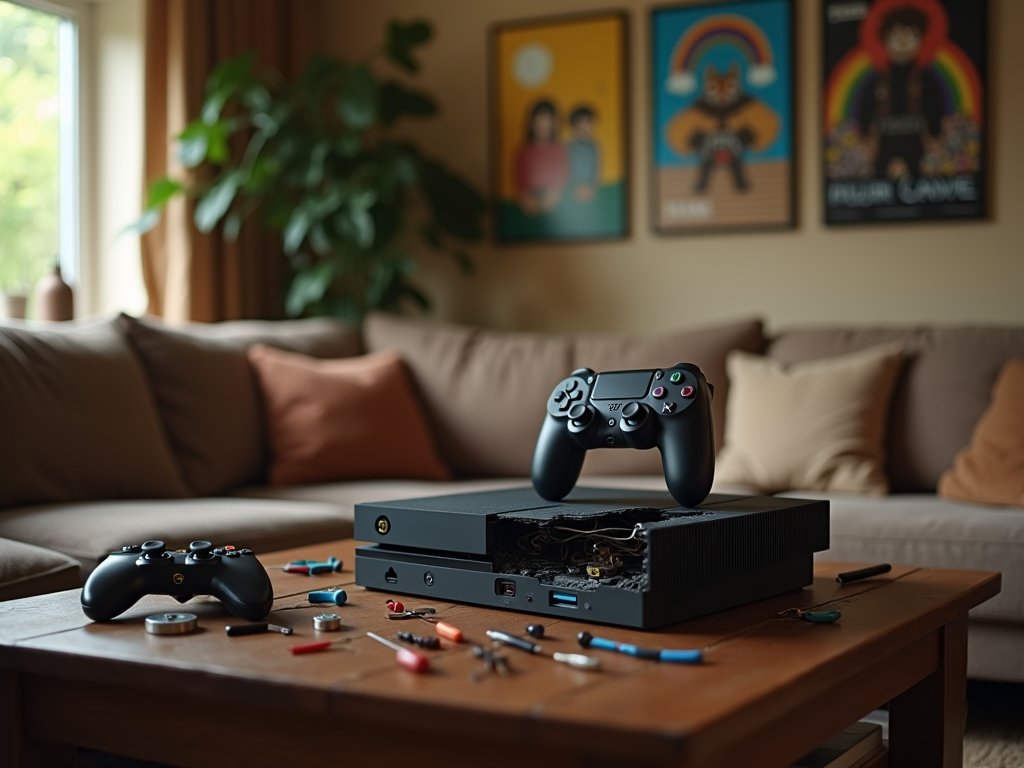When faced with a broken gaming console, the most pressing question is whether to repair the device or replace it altogether. This decision can hinge on various factors, including the age of the console, the nature of the damage, and your personal budget. In this article, we will delve into the pros and cons of both options and guide you through making an informed choice that suits your circumstances.
Assessing the Damage

The first step in determining whether to repair or replace your broken gaming console is to accurately assess the damage. Not all issues are created equal, and some problems may be minor and easily fixable, while others could signify a more significant underlying fault. Here are a few common issues to consider:
- Power failure: Is the console not turning on at all?
- Physical damage: Are there signs of breakage or impact?
- Overheating: Does it shut down unexpectedly during gameplay?
- Software glitches: Is it freezing or crashing regularly?
- Peripheral compatibility: Are your controllers and accessories functioning properly?
Understanding the nature of the damage is crucial because this will significantly influence whether a repair is feasible or cost-effective in your situation.
Repairing Your Console

Opting to repair your gaming console can be an attractive choice, especially if the problem is minor or the unit is relatively new. Repairs often come with a lower upfront cost compared to purchasing a new console, particularly if you can handle the job yourself or find an affordable repair shop. Additionally, fixing a console can preserve valuable data and game progress that may be lost if you switch to a new device. However, consider these factors:
- Available warranties: Is your console still under warranty, covering repairs?
- Repair costs: Are the parts and labor manageable within your budget?
- Technical skills: Are you confident in attempting to fix the issue yourself?
- Future reliability: Will this repair hold up, or is it likely to fail again soon?
- Availability of parts: Can you source the necessary components easily?
Thoroughly evaluating these aspects can help you determine whether a repair is the most sensible route to take.
On the other hand, there are compelling reasons to consider replacing your gaming console rather than repairing it. The gaming industry evolves rapidly, and new consoles come out with advanced technology, more powerful specifications, and exciting game titles. If your console is several years old, investing in a new unit might provide vastly improved performance and a better gaming experience. Here are several reasons to contemplate replacement:
- Outdated technology: Does your console lag behind newer models?
- Significant damage: Is the cost of repairs nearly equal to the price of a new console?
- Broad compatibility: Will a new console enhance your gaming library with better compatibility for games and accessories?
- Long-term investment: Will a new console serve you for several years without issues?
- Enhanced features: Are there new features available that you would benefit from?
Ultimately, if the costs of repairs significantly outweigh the benefits, investing in a new console may be the better option in the long run.
Cost Considerations
The costs associated with either repairing or replacing a gaming console can greatly influence your decision. While repairs may initially seem less expensive, long-term sustainability must be considered. A comprehensive cost analysis should include:
- Repair costs: Assess both the financial and time investment for repair.
- Replacement costs: Factor in the expense of a new console, including possible games and accessories.
- Warranty implications: Understand how warranties could impact repair and replacement costs.
- Future expenses: Consider how often repairs may be required for an aging console.
- Resale value: Determine if repairing increases the resale value of an older console.
Weighing these financial implications will help you make a more informed decision tailored to your budget and situation.
Conclusion
Choosing between repairing or replacing a broken gaming console can be a challenging decision. By thoroughly assessing the damage, evaluating the costs, and considering both immediate and long-term benefits, you can arrive at a solution that suits your gaming needs. Whether you opt for repair or replacement, understanding your options will ensure you stay in the game without breaking the bank.
Frequently Asked Questions
1. Can I fix my console at home?
Yes, many minor issues can be resolved at home with the right tools and a bit of technical know-how. However, always consider the risks, as opening the console may void warranties.
2. What common repairs can be done on gaming consoles?
Common repairs include replacing broken power ports, fixing disk drives, and updating software. More complex repairs might require professional assistance.
3. Is it worth buying a used gaming console?
Buying a used console can be a cost-effective solution, but ensure it’s in good working condition and check for any warranties before purchasing.
4. How do I know if the repair cost is too high?
A good rule of thumb is to compare the repair cost with the price of new consoles. If repairs cost more than half the retail price of a new console, consider replacing it instead.
5. What should I do with my broken console if I choose to replace it?
Consider selling or recycling your broken console. Many retailers offer trade-in programs, and recycling ensures proper environmental disposal.


